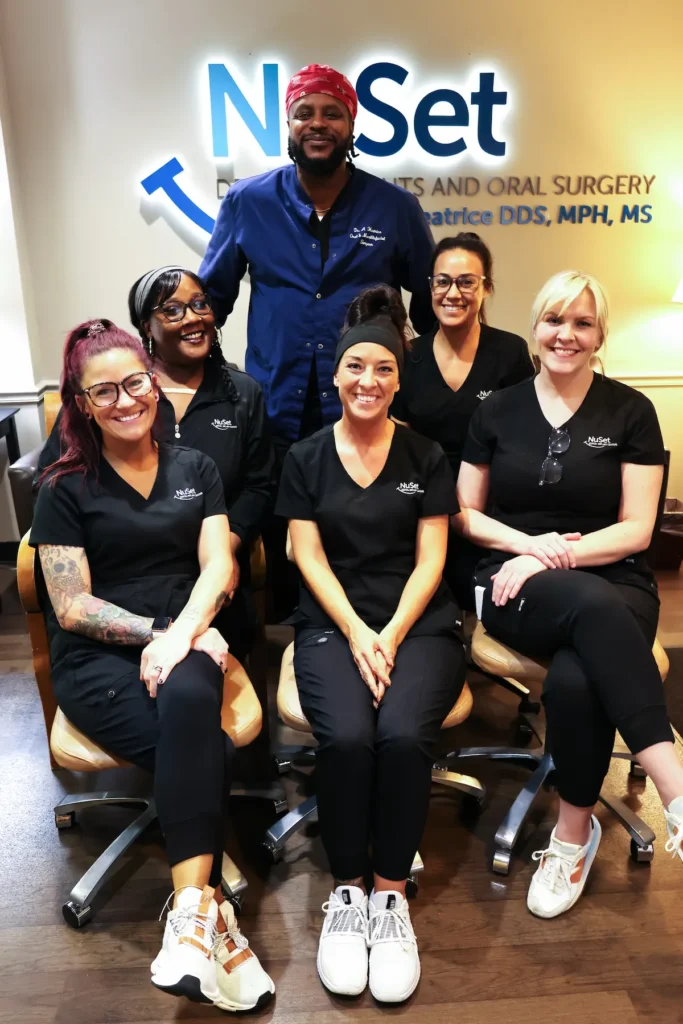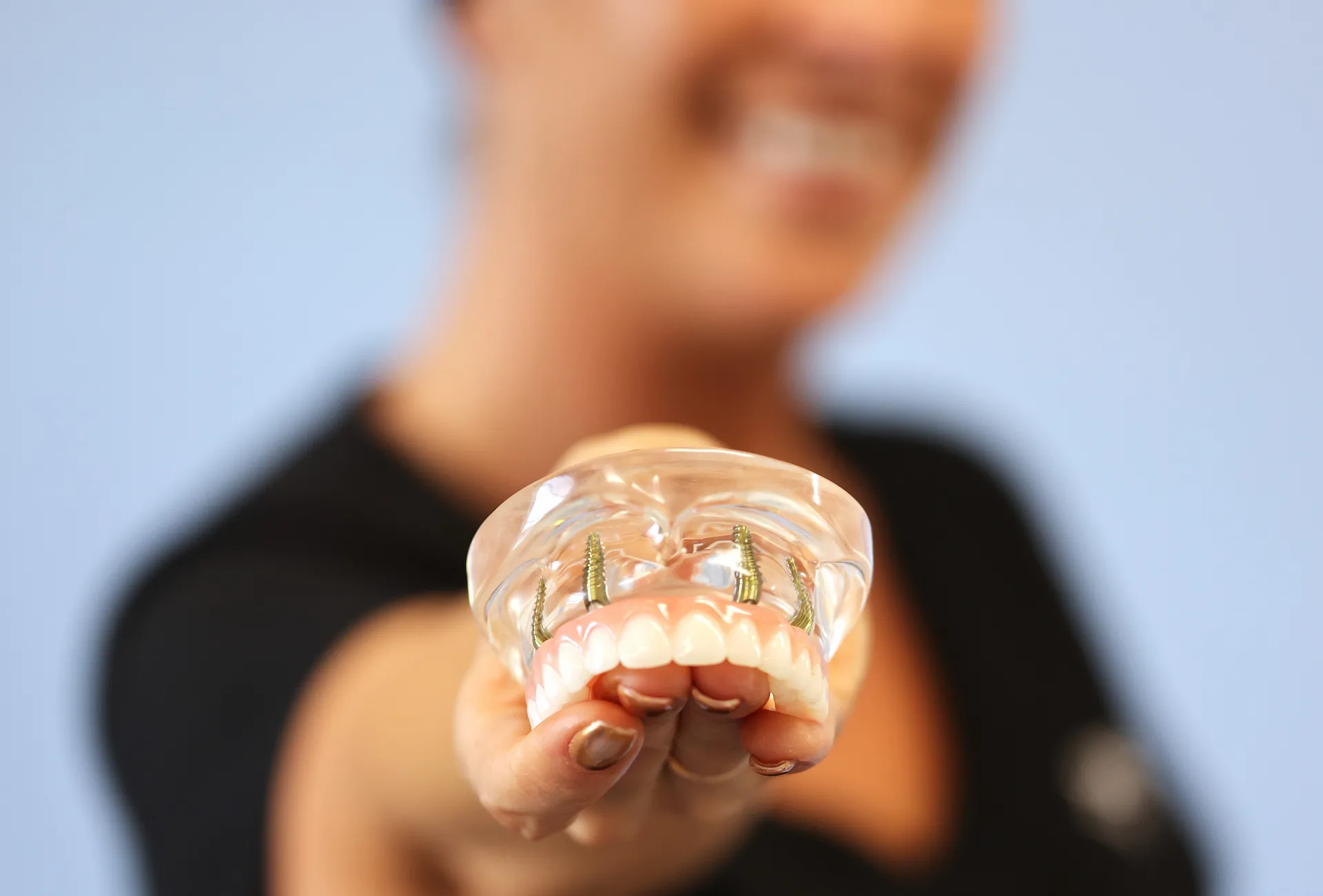Dental implants are an excellent way to replace missing teeth. They function like real teeth, restoring your perfect smile and allowing you to enjoy foods you love. Implants also preserve jawbone health and enhance your facial structure for a youthful and confident appearance.
While implants offer many benefits, maintaining good oral hygiene is essential to their longevity. Though implants don’t develop cavities, there is still a small risk of infection around them, but this is typically only seen during the healing phase.
While most of these cases can be painlessly resolved, untreated infections can lead to serious issues like jawbone loss and even implant failure. If you’re dealing with a dental implant infection, it’s important to know you’re not alone and help is available.
Let’s discuss what a dental implant infection is and how you can effectively treat it.
Quick Look: Treating Dental Implant Infections with NuSet
At NuSet Dental Implants and Oral Surgery, we’re dedicated to preventing dental implant infections with meticulous care before and after procedures. While infections can still occur, our expert team uses advanced techniques, including targeted antibiotics and precise cleaning, to effectively address infections and prevent recurrences. Trust our experienced professionals to provide comprehensive care and guidance for treating and safeguarding against dental implant infections, ensuring your oral health is in capable hands.
What is a Dental Implant Infection?
A dental implant infection, also known as peri-implantitis, occurs when bacteria build up around the implant site. This infection can affect the soft and hard tissues surrounding the implant. It is similar to gum disease but occurs around an implant instead of a natural tooth. If not treated, it can lead to bone loss and implant failure.
Recognizing and addressing this infection early is key to maintaining the health and functionality of your dental implant.
What Causes Dental Implant Infection?
Dental implant infections can develop due to several factors. Here’s a detailed look at why these factors contribute to infections:
Poor oral hygiene
When you don’t brush regularly or maintain dental hygiene, food particles and plaque can accumulate around the implant. This creates an environment where bacteria thrive, leading to an infection. For example, neglecting to clean around the implant base can result in plaque buildup, which harbors harmful bacteria.
Smoking
Smoking affects blood flow to the gums, reducing the delivery of essential nutrients and oxygen needed for healing. This impairs the body’s ability to fight off infections and prolongs the healing process.
Compromised immune system
Conditions such as diabetes or medications that suppress the immune system can make it harder for your body to combat infections. A person with uncontrolled diabetes may have higher blood sugar levels, which can impair white blood cell function and lead to an increased risk of infection around the implant.
Pre-existing gum disease
If you have untreated gum disease, the bacteria from the infected gums can spread to the implant site, making it more likely that an infection will develop around the implant.
Allergic reactions
Although rare, some individuals may be allergic to the materials used in dental implants, such as titanium or other metals. This can lead to inflammation and infection.
Understanding these causes helps in taking preventive measures to reduce the risk of infection and ensure the success and longevity of your dental implants. Regular dental check-ups and maintaining good oral hygiene are essential steps in preventing these complications.
Signs and Symptoms of an Infected Dental Implant
Recognizing the signs and symptoms of an infected dental implant is crucial for early treatment. Here are the key indicators to watch for:
- Persistent pain around the implant site
- Inflamed gums around the implant area
- Gums that bleed when you brush or floss around the implant
- Pus or a foul taste in your mouth
- Loose implant
- General feelings of being unwell, including fever, can accompany an infection.
If you notice any of these symptoms, contact your dentist immediately for an evaluation and appropriate treatment. Early detection is key to preventing more serious complications and ensuring the health of your dental implant.
Can an Infected Dental Implant Be Saved?
If the infection and bone loss are in the early stages, we can often save the implant with non-surgical treatments. This includes removing bacterial plaque and calculus, using antibiotics, and modifying the prosthetic design. Early treatment makes the process simpler and increases the chances of success.
If bone loss is moderate to advanced, surgical cleaning of the affected tissues may be necessary. This involves decontaminating the implant surface and applying bone regeneration techniques to recover lost bone.
In cases where the implant has become loose due to severe infection, it may need to be removed. The site can then be grafted with bone, and a new implant may be placed once the infection is cleared and new bone has regenerated.
Regular check-ups and professional cleanings every four to six months are crucial. At NuSet Dental Implants and Oral Surgery, we prioritize these appointments to monitor your implants for early signs of inflammation and infection. This proactive approach allows us to take prompt action if any issues arise, ensuring the best care for your dental health.
Treating Dental Implant Infection with NuSet

At NuSet Dental Implants, patient health and safety are our top priorities. We understand that undergoing dental procedures can be daunting, which is why we use cutting-edge technology and highly skilled oral surgeons to minimize the risk of dental implant infection effectively.
From thorough sanitization processes to streamlined implant placement techniques, we take every precaution to provide a safe and comfortable experience for our patients.
Alongside prioritizing safety, we also take pride in providing exceptional patient care and post-op support. Our team of dedicated professionals is available to guide patients throughout the healing process, offering personalized advice and answering any questions that may arise.
Our ultimate goal is to ensure that our patients remain healthy and comfortable, leaving our practice with a radiant smile and confidence in their restored dental function.
Schedule Your Appointment for Healthy Dental Implants at NuSet Dental Implants and Oral Surgery
If you suspect a dental implant infection, it’s vital to act quickly. Early detection and prompt treatment can save your implant and prevent further complications. Schedule regular check-ups and professional cleanings every four to six months. This allows us to monitor your implants and catch any early signs of infection.
At NuSet Dental Implants and Oral Surgery, we are dedicated to providing comprehensive care to keep your dental implants healthy and functional. Contact us now to ensure the best care for your dental health.
Frequently Asked Questions
How to Treat a Dental Implant Infection at Home?
Treating a dental implant infection at home involves maintaining good oral hygiene. Brush and floss around the implant carefully, and use an antiseptic mouthwash to reduce bacteria. However, home care is not a substitute for professional treatment. If you suspect an infection, contact your dentist immediately.
Can a Dental Implant Infection Go Away on Its Own?
No, a dental implant infection will not go away on its own. Without treatment, the infection can worsen and lead to more serious complications. It’s essential to seek professional care to address the infection properly.
How Will I Know if My Dental Implant is Infected?
Signs of a dental implant infection include persistent pain, swelling, redness around the implant, bleeding gums, pus discharge, and implant mobility. If you notice any of these symptoms, contact your dentist for an evaluation.
Can Antibiotics Cure Implant Infection?
Antibiotics can help control and reduce the infection, but they may not be enough on their own. Professional cleaning, improved oral hygiene, and sometimes surgical intervention may be necessary to treat the infection fully and prevent further issues.





